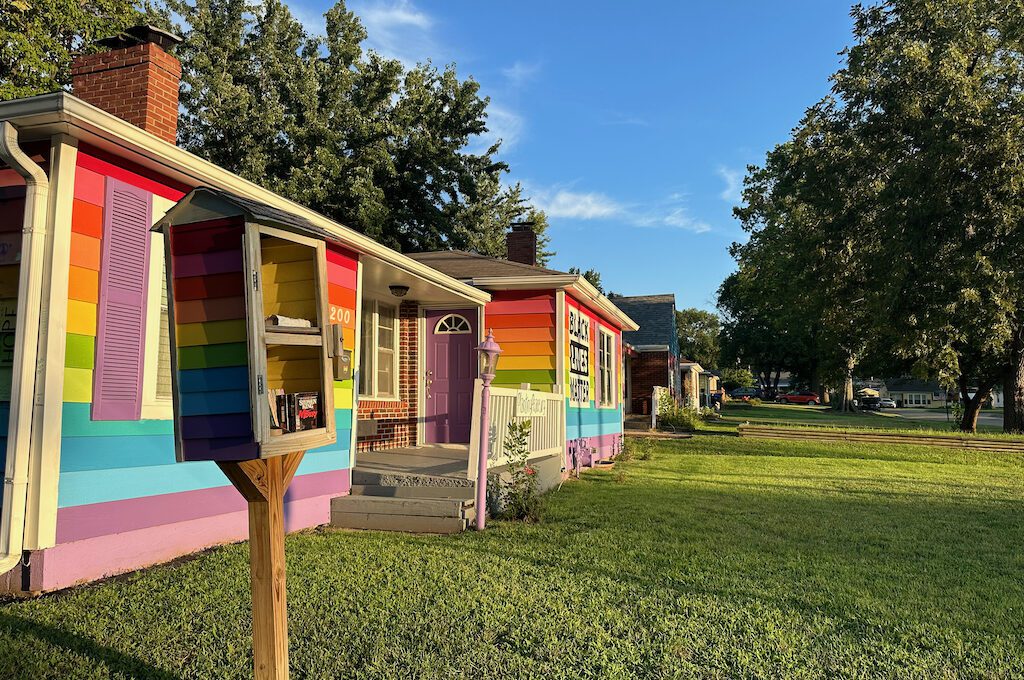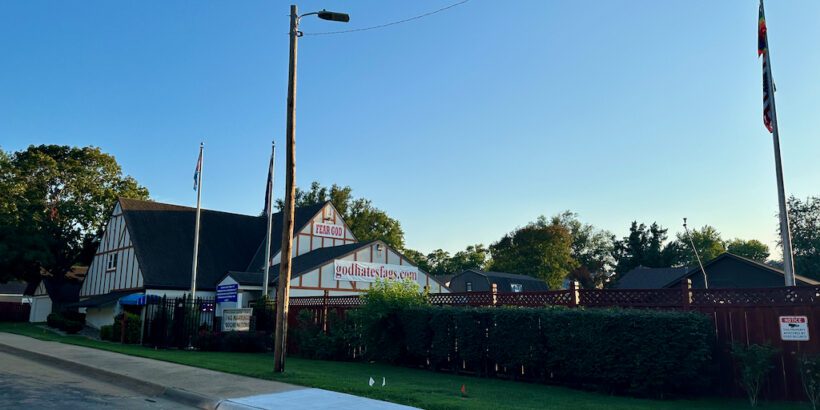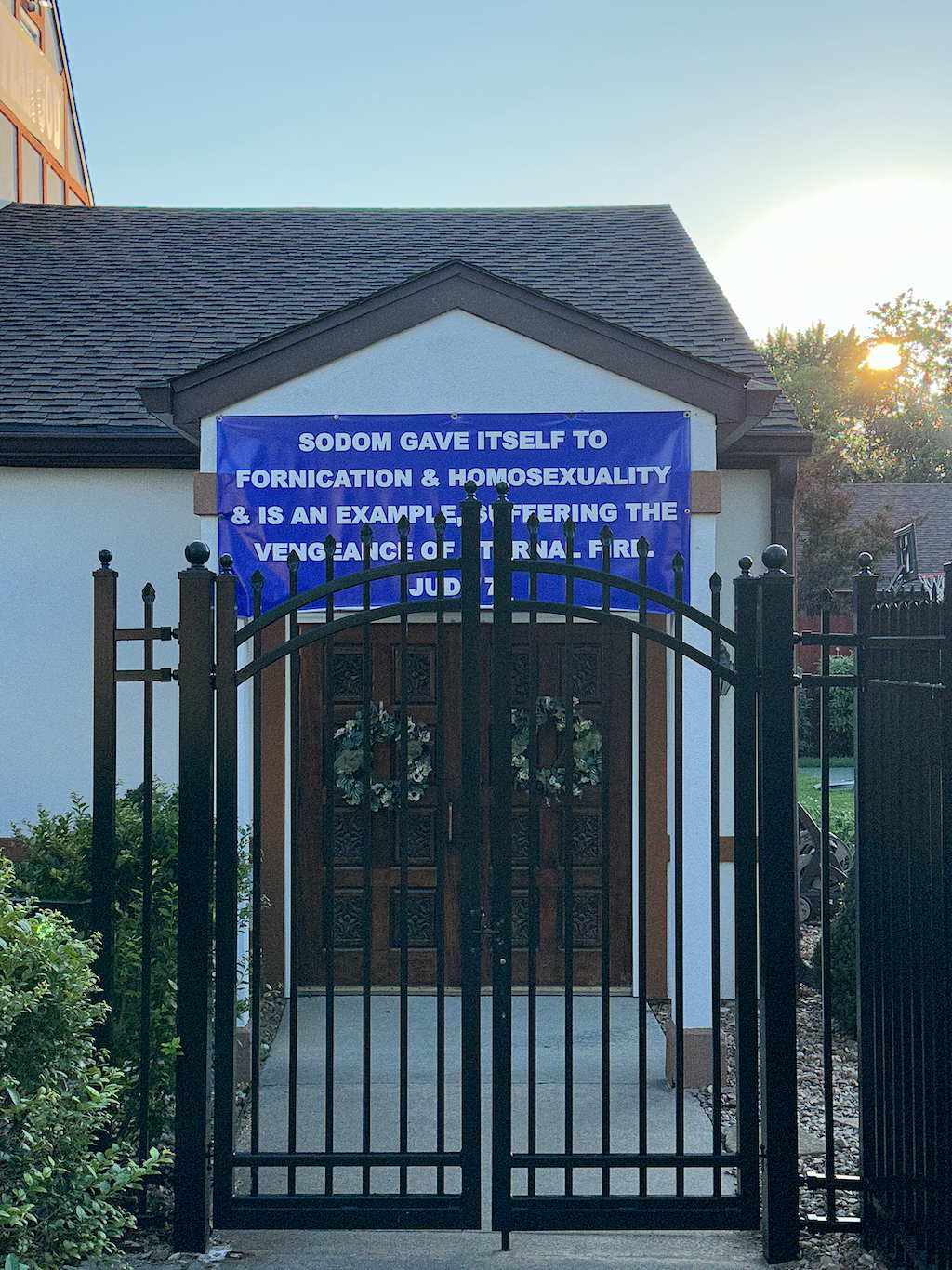In a tranquil Topeka, Kansas neighborhood, an unmistakable divide becomes apparent along the street.
Occupying a corner of this neighborhood stands the Equality House, adorned with the vibrant colors of the Pride flag.
The Equality House was purchased in 2012 by Aaron Jackson, the founder of nonprofit organization Planting Peace, after he saw a “for sale” sign on a house when looking at the neighborhood on Google Earth.
It’s painted to resemble the pride flag with the rainbow colors and is “a symbol of compassion, peace, and positive change.”

In stark contrast, just across the street, looms the notorious Westboro Baptist Church (WBC), the controversial religious organization founded in Topeka, Kansas, in 1955 by Fred Phelps.
It’s a “church” mostly composed of family members and recognized for strong anti-gay rhetoric and its picketing of military funerals and public events with offensive signs and slogans.
Westboro has been condemned by other Christian churches and several organizations consider the church to be nothing more than a hate group, while others suggest its a cult.
The church’s activities have led to numerous legal challenges, especially those around free speech. They’ve won some battles, lost some battles, and have had their fair share of ethical issues with the Bar as several members of the family are lawyers.
Their formula has always seemed pretty simple to me.
Push the legal boundaries as far as they can go and aim for the most amount of controversy to increase public exposure and ridicule. The more exposure they get, the more their message spreads. The more ridicule that they receive, the more legitimate (in God’s eyes) their message becomes.
“Nobody has the right, in my view, to think he’s preaching the truth of God unless people hate him,” their founder Fred Phelps once said.
As much as I despise their tactics, in my eyes groups such as this are just sort of the price we have to pay for free speech.
I fully support restrictions placed around events like funerals that force protesters to keep a distance but free speech is something that I put a lot of value on.
Granting the government broad discretion to determine what speech is acceptable and what is not could lead to a slippery slope where freedom of expression becomes curtailed. Government authorities might use their power to suppress dissenting voices, stifle political opposition, or silence unpopular viewpoints.
Where it becomes incredibly hard to swallow is when it comes to kids.
At these protests, the church displays abhorrent messages such as “thank God for IEDs,” often getting small children to carry these hate-filled messages.
Indoctrinating small children into extremist thinking is heartbreaking to see.
When extremist ideologies are forced upon them at a young age, their developing minds can become captive to these ideas, making it difficult for them to critically evaluate or question the beliefs they are being taught.
These kids will likely grow up alienated and in the case of WBC, some even claimed that they were subject to abuse and now face issues with PTSD.
The threat of being excommunicated from their community, losing the support of their family and social network, and having their realities shattered can be an overwhelming possibility for anyone thinking about leaving.
With an organization like Westboro Church, it’s hard to imagine any scenario where one person could be impacted enough to change their position and break out.
Yet, as many as 20 family members have turned away from the church and Phelps family. Several of these ex-members have written books and spoken out publicly about WBC.
One of the most notable cases is Megan Phelps-Roper who left after engaging in Twitter debates with people who challenged her beliefs and brought contradictions to the surface. It’s actually how she met her husband, Chad Fjelland, as well.
Another notable person is Danielle Phelps who is openly gay and joined the Marines and like other ex-members is vocal about her prior WBC life.
With so many leaving and the passing of their founder in 2014 (after he was reportedly voted out) it seems that the church has lost a lot of its steam. Compared to a decade or two ago, things seem to have been very quiet for Westboro, though they do continue to picket.
So why visit them now?
Back when I attended a Christian school located in a conservative Texas community from 2001 to 2006, I faced some of the darkest times being closeted.
When you’re 15, devoid of confidantes, enduring doctrinal condemnation on a regular basis, and bracing for the heart-wrenching prospect of alienation from those held dear, a unique blend of fear, isolation, and denial engulfs you.
Imagine going to youth service thinking that this will be the day it happens. The day that you suddenly escape damnation and become straight because God is going to answer your prayers.
At some point, about midway through the service, you start to feel like something special is happening. Butterflies begin to emerge, hopes start to get realized, and you can’t wait to give God thanks for your “miracle.”
You make your way to the front during the altar call, anticipating that something divine is about to occur, and eagerly await the laying on of hands as the service draws to a close.
Then, after the service ends and once the euphoria wanes, like getting smacked by a ton of hardcover bibles, reality comes crashing down on you reminding you that this was just an illusion and its time to go back to your bedroom and deal with the evening’s heartbreak on your own.
Now have this happen to you on repeat for 5 to 6 years.
The good news for me is that I got through it and became a more resilient person for it.
I don’t lean into the victimhood, dwell on the injustices, or hold grudges. None of that is productive or particularly attractive to me.
Instead, my thinking is more along the lines of: it happened, it sucked (royally), but it’s just one more reason why I feel like I can persevere through just about any mental battle that comes my way.
After those tumultuous high school years and during college and law school, I was on the long and bumpy path to coming out and it was during this time that I was often exposed to WBC.
When I was constantly researching biblical arguments and homosexuality, guess who tended to pop up a lot during that era?
Each time I came across WBC I was always repulsed on a deep level. Whether their presence tainted military funerals or their anti-gay messages oozed forth, the repugnance was visceral.
It wasn’t even so much the hate that got to me, though.
In some ways, what they were doing felt even darker.
It’s the contorted fabric of doctrine, defiantly opposed to reality’s influence, that makes this a more dynamic and withstanding force than pure hatred.
When you’re dealing with hate, it’s often a product of ignorance or the searing ache of personal pain. Both of these maladies, with the right amount of exposure and love, can often be soothed and mended. Hate has a tendency to fizzle out over time.
I can personally attest to that having watched some people very close to me come around in a major way after I came out despite some of their prior views being largely held up by hate.
And sure, WBC bears the scars of their own pain and ignorance as told by its ex-members.
Yet, what is truly chilling is their chosen battleground — a realm where the forces of love, knowledge, and reason struggle to breach the fortified walls of their conviction.
In this realm, twisted ideologies can merge with unchecked tribal instincts against “outsiders” to produce wild results. Distorted beliefs and repulsive values perpetuate through time and are born over and over again via indoctrination and brainwashing.
If hate can be likened to a shroud of darkness, then this place exists within a black hole — a gravitational singularity devouring all enlightenment in its grasp.
So when I walked up to the WBC compound, it stirred a few emotions. A little shot of adrenaline, curiosity, tenseness, and believe it or not, empathy.
After all, I have experience escaping my own abyss. I can understand, to a degree, the type of inner dialogue some of those members have experienced. It can be rough, to say the least.
As I stood on this quiet and empty suburban street, I noticed WBC looked a lot smaller than I’d imagined and its anti-gay signs hung up on the building’s exterior had lost much of their sting.
My gaze then moved to the Equality House.
It’s reported that Fred Phelps, the founder of WBC, was ousted after he told people at the Equality House, “you’re good people” or something along those lines. Reportedly, he had been suffering from dementia which some people think may have actually opened his eyes up in his last days, which he apparently experienced largely in isolation.
Taking in the brilliant colors painted on the Equality House, a sense of peace finally landed.
It was this weird reminder that order had been largely been restored in my life.
I reflected on the 10 year relationship I have with my husband and how far removed those days of fear, isolation, and self-loathing felt. Their remnants are still felt but they are just that, remnants.
There was a recognizable release within me and I felt a washing over of gratitude on this hot and humid evening in Topeka, Kansas.
After getting a few photos we hopped back in the car to grab a burger for dinner. And as I watched WBC disappear in my rearview mirror, I felt a little lighter.
Daniel Gillaspia is the Founder of UponArriving.com and the credit card app, WalletFlo. He is a former attorney turned travel expert covering destinations along with TSA, airline, and hotel policies. Since 2014, his content has been featured in publications such as National Geographic, Smithsonian Magazine, and CNBC. Read my bio.


